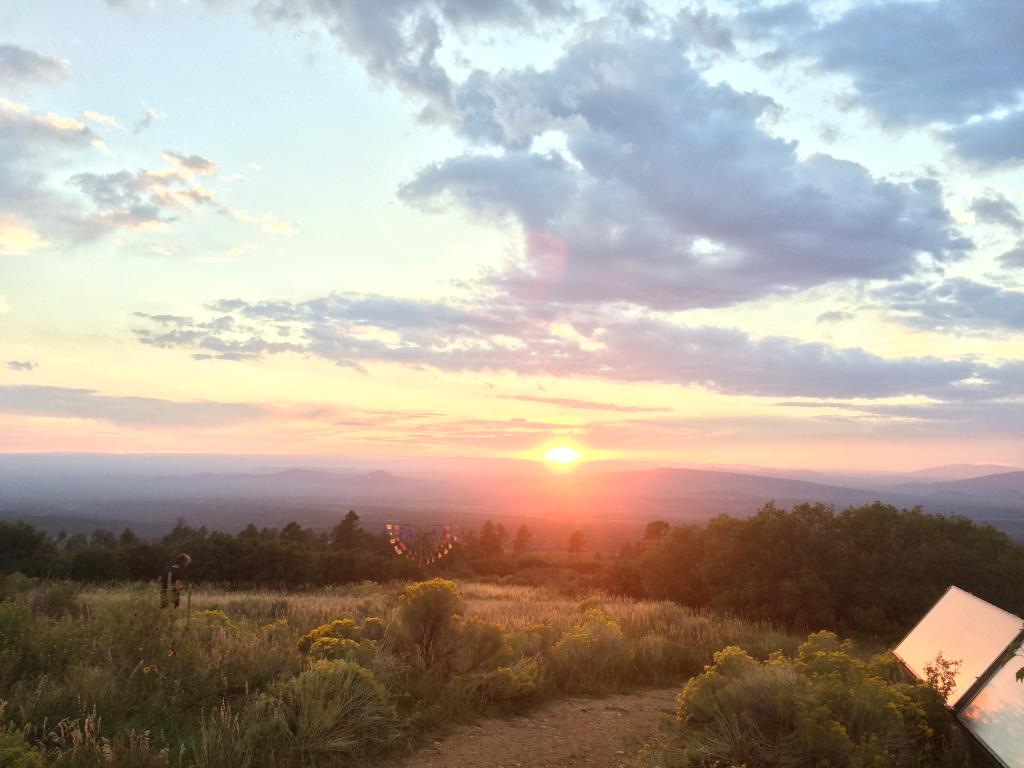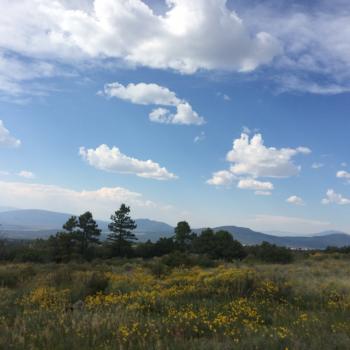
Work: activity done to achieve a purpose or result
Being: existence
I write these words from the kitchen floor of our family’s three-bedroom house. My two children are in the room next to me, and I’m thinking about our day today, about what work needs to be done, about how we can be together.
Working and being are things that often rub each other the wrong way, at least in American culture. We say work is the thing that gets us what we need and what we want, and being is just something that happens because we are alive, because we are breathing.
But what if our working and our being are actually deeply connected to each other, and feed each other constantly? What if the things we work toward are a part of our being, and what if our being here right now is actually the first greatest work we can do?
Being present to our own existence, to our relationships, to the state of who we are, where we’ve come from and where we are going, is difficult to get to in the clutter of our lives. But that in itself is the hard work, the work of our health that leads to the work of our hands and our feet out in the world.
I am an enrolled member of the Potawatomi Citizen Band tribe out of Shawnee, Oklahoma. Last year I began to learn more about my own Potawatomi heritage and the general history of indigenous peoples in the United States and Canada. I began to write down my own story, remembering the stories of the ancestors of my own tribe and many other tribes as well. At the same time, Standing Rock was showing the world that native peoples are alive today, working to care for the earth and come together with other natives and with non-natives to create change.
As I watched live feeds from my living room, and as I read book after book of indigenous stories, processing my own story along the way, I realized that my body could barely hold the work I’d been doing. Every day around the same time, my limbs would grow heavy, my legs would give out from beneath me, and I would have to stop everything and just be. I’d lay down on the couch and stare outside at the flowers hanging by the window, or I’d go outside and sit in the shade while my two boys played in the yard.
You see, my being and my working were connected to each other, and it took me a long time to realize that. I didn’t know that the difficult work of processing who I am and the people I come from is connected to who I am in every aspect of my life. It’s connected to my being. Once that became clear, I began to practice daily Sabbath, daily moments of stopping, resting, restarting for myself. I had to come to terms with myself and with others that compartmentalizing things wouldn’t work for me, because everything is connected. It’s the structure of the medicine wheel, the cycle of the seasons of the year, the cycle of life from birth to death.
In American culture, we’ve long associated work with the office chair, the retirement fund, the often immediate results that come from energy, sweat and blood. It bleeds into our religious circles, our social circles, our economy, and often our families.
We think, work, and heal in a linear way, and not a cyclical way. This means that the work we do and the way in which we live are not always connected, not always in sync, not considered things that affect one another. We are the people of compartmentalizing, and that can be damaging to our work and our relationships, even our own well-being.
Richard Rohr describes this as a dualistic kind of living and thinking. But the more we separate our life into individual and separate compartments, the more we begin to call one thing good and another thing bad, and we miss the actual experience of all of our work and all of the ways we are wired to be.
I grew up an impatient child, and while I appreciated small moments of being, I was never comfortable with sitting still, with doing that kind of work. As an adult, as I learn more about who I am as an indigenous woman and a contemplative, I am understanding that this is actually essential to my own well-being and the well-being of my family. From my own experiences today– in practicing aspects of indigenous ceremonies like smudging (burning sage and sweetgrass) and prayer– I am able to slow down both my work and my being. Sometimes I take my boys to visit historical native sites here in Georgia. We take tobacco and as we drop it on the ground, we give thanks both for our own ancestors and the ancestors who once walked this land, and we acknowledge that this kind of practice—of gratitude—is also a work of being. It is difficult to train ourselves to slow down, to be present, to see life as cyclical and not linear, but it is what we strive for.
We have a yard full of celosias, autumn fire, birds of paradise, zinnias and marigolds. We watch bumblebees eat from flower after flower, and it reminds me that even the bees, who only do what they know, have it figured out more than I do most times. As people, we overcomplicate the process. We get distracted. We lose our way. Coming back to nature, watching creation show us how it works, reminds us of our place in this world. And the more I sit watching and listening to the world of nature, I am filled up to write my own story and to process my own life, my own work, my own sense of being, and I’m brought back to a sense of child-likeness that gives me hope for the world.
If we restructure the lens through which we see things in our life working together, maybe we can restructure what it means to work and to be.
My motherhood affects my work as a writer, and who I am as a wife and partner affects the way I work in all my relationships and my faith. My work in parenthood is connected to who I am as a Potawatomi woman, and the books that come out of those experiences are aspects of my work and my being, connected in all things whether I can see it or not. So daily practice looks a lot like stopping to refill so that I can begin again and again. While this is opposite much of America’s ideas for work, it fits who I am as a native woman and as a contemplative.
But in America, we often see people who produce small things and we imagine that they are lazy, and people who produce big things or make a lot of money for their work as the ones who matter. We see that more hours worked means more value on that work. We say that being doesn’t matter, because it’s just existing. We don’t realize that existing can be the hardest work of all. Even in the church, in which I have been working and leading for years, holds little room for this kind of rest, because we want to see direct results: spikes in attendance and extra tithes on Sundays. We forget the work of being and the value of the souls that need a gentler kind of vision of work.
To become a healthier nation and a healthier people, we can learn to practice Sabbath more often, remembering that even rest is a kind of work, and even the act of doing nothing, of listening, of stopping, or even being is a kind of work, and maybe the most important work of all.
To be healthy, we recognize that work cannot always be measured by a time card. It should also be measured by our own hearts.
If we can value this world, and in doing so, value humanity enough to see that your being and mine are different kinds of being, we’ll learn to realize that your work and mine are different kinds of work—and that they both matter, because they both have value in their creativity.
But it requires a lot of us. It requires a new kind of thinking. It requires that we look at time and space differently, that we consider things to hold spiritual meaning when we didn’t think they did before. In Potawatomi culture, when we use objects like sage or sweetgrass for prayer or ceremony, it becomes something that is living and breathing—its being is acknowledged because it teaches us about ourselves and the world around us. If we learn to think this way, it means examining ourselves often, and facing our own fears and pain in a more honest way.
That is the hard work of life, isn’t it?
That is the true way of being, isn’t it?
“We do not think ourselves into new ways of living, we live ourselves into new ways of thinking.” –Richard Rohr












